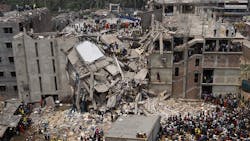Retailers Find 80,000 Safety Hazards at Bangladesh Factories
DHAKA -- European retailers said on Tuesday they had found thousands of safety problems while inspecting Bangladesh garment factories in a drive to prevent a repeat of last year's Rana Plaza disaster that claimed over 1,100 lives.
The Bangladesh Accord on Fire and Building Safety, an umbrella group of nearly 200 European brands such as H&M and Carrefour, said inspectors discovered 80,000 safety hazards in the 1,106 factories investigated this year.
"We've found safety hazards in all factories... from minor to significant," said Brad Loewen, the Accord's chief safety inspector.
Retailers last year bought $24.5-billion worth of clothing from the impoverished South Asian nation, much of it from plants where safety was a major problem.
Another retail group, the Alliance for Bangladesh Worker Safety representing mainly U.S. brands such as Walmart and Gap, completed inspections of 587 factories in July.
Western retailers launched the unprecedented inspections following the 2013 cave-in of the nine-storey Rana Plaza factory complex that killed 1,138 people and injured over 2,000.
The disaster highlighted often highly lax safety standards in Bangladesh's more than 4,500 garment factories.
Bangladesh's success in sewing clothes at low price have made it the world's second-largest garment exporter after China.
Loewen said inspectors found safety problems ranging from heavy machinery overloading floors to shoddy electrical wiring and lack of proper fire exits.
"More than 100 factories had to reduce their (machinery) load," he told AFP.
Many factories must now undertake "expensive" repairs to their plants, he added, estimating the cost could hit over $1 billion.
"A lot of work needs to be done to bring them up to safety standards," he said.
Manufacturers have sought low-interest loans from retailers to upgrade safety and a private-sector arm of the World Bank has also indicated willingness to extend cheap loans.
Bangladesh garment manufacturers said they were happy at the review's results after earlier voicing alarm that the inspections might hurt trade.
"We're very satisfied," Shahidullah Azim, vice-president of the Bangladesh Garment Manufacturers and Exporters Association, said.
"After Rana Plaza, a lot of people painted a doomsday scenario, saying most plants would be closed if inspections were conducted," he said.
"But the inspections by the two retailers' groups led to closure of only 20 factories -- less than one percent of total factories," he said.
Azim said the inspections have started bearing fruit since many brands which shunned Bangladesh after the Rana Plaza collapse have returned.
"There's been a retail order boom," he said
Year-on-year growth in Bangladesh garment shipments hit a five-year-low of under one percent in the first quarter of the financial year starting in July.
But Azim said new orders would boost export growth as the year progressed.
-- Shafiqul Alam, AFP
Copyright Agence France-Presse, 2014
About the Author
Agence France-Presse
Copyright Agence France-Presse, 2002-2025. AFP text, photos, graphics and logos shall not be reproduced, published, broadcast, rewritten for broadcast or publication or redistributed directly or indirectly in any medium. AFP shall not be held liable for any delays, inaccuracies, errors or omissions in any AFP content, or for any actions taken in consequence.
